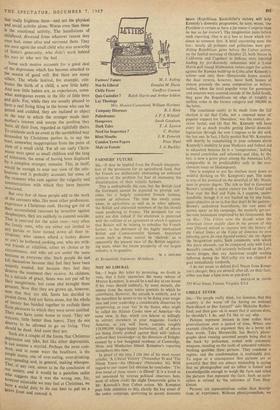NOT SO LIBERAL begin this letter by protesting, no doubt
in vain, that I fully appreciate the many talents of Murray Kempton. It would be a sad day at our house if his voice should suddenly, by some miracle, dis- appear from the many native journals to which he contributes. However, the miracle is unlikely, and in the meantime he seems to me to be doing your maga- zine and your readership a considerable disservice by perpetrating, as your 'eye' in the States, what might he called the Alistair Cooke view of America—the same view, in fine, which you labour so tellingly to correct elsewhere in your magazine. Cooke's America, as you well know, contains roughly 179,999,999 trigger-happy barbarians, all of whom are being slowly pushed against their will—indeed, without their knowledge—in the direction of Enlight- enment by a few benighted residents of Cambridge, Mass. and Manhattan Island. Kempton's reporting strengthens this view.
In proof of my text, I cite two of his most recent articles, 'A Liberal Victory' (November 9) and 'The Nixon Years—An Obituary' (November 16). With regard to our recent fall election he concludes: 'The firm trend of these returr.s is liberal.' It is a trend as yet unnoticed by veteran political observers here, most of whom credit the slight Democratic gains to Mr. Kennedy's firm Cuban action. Mr. Kempton pays little attention to this, clearly the key event of the entire campaign, preferring to accent domestic issues (Republican Rockefeller's victory will help Kennedy's domestic programme, he says; worse, 'the President is certain to have a far easier Congress than he has so far known'). The imagination pales before such reporting. One is at a loss to know which evi- dence to summon first. A brief smattering none the less: nearly all pollsters and politicians were pre- dicting Republican gains before the Cuban action; on the fateful morning of October 22, both Nixon in California and Capehart in Indiana were reported leading by pro-Kennedy columnists and a Louis Harris poll found Midwestern voters eager for action against the Russian build-up in Cuba after Kennedy's action—and only then—Democratic hopes soared; the final returns, however, leave both houses at almost precisely the same composition as before; indeed, when the total popular votes for governors and senators were counted outside of the Solid South, they gave the Republicans an edge of roughly a million votes in the former category and 500,000 in the latter.
The conclusion surely to be made from the fall election is (a) that Cuba, not a renewed wave of popular support for 'liberalism,' was the central, de- cisive factor, and (b) that Mr. Kennedy will have every bit as much trouble getting liberal domestic legislation through the new Congress as he did with the last one. In fact, 1 flatly predict that Mr. Kempton will shortly be complaining in your columns about Kennedy's inability to pass Medicare and federal aid to education because he is a 'compromiser,' lacking in moral conviction and reformist zeal (this, by the bye, is now a genre piece among the American Left, comparable in its predictability only to the neo- classicist essay on Shakespeare).
One is tempted to put the election story down to wishful thinking on Mr. Kempton's part. The same is true of his jeremiad on the downfall of Mr. Nixon, save in greater degree. The itch to find in Governor Brown's triumph a moral victory for the Good and True over the Bad and False is, I suppose, under- standable, though it is not backed up by any facts, quasi-objective or no (a few that don't fit the pattern: Brown's undoubted boorishness, the vast sums of money spent on his campaign, the masterly get-out- the-vote techniques employed by his lieutenants). But sip this: 'The Fifties were the decade when the American lower middle class in the person of this man [Nixon] moved to engrave into the history of the United States as the Voice of America its own faltering spirit, its own bigoted nature,' etc. etc. Again the imagination pales. Such comments, with which this piece abounds, can be compared only with Lord Russell's remark, still solemnly believed on the Lab- ourite fringes, that any American caught reading Jefferson during the McCarthy era was clapped in gaol immediately forthwith. I do not pause to defend Evil Nixon from Kemp- ton's charges; they are absurd, after all, on their face; either you hear a false note or you don't.
DOUGLAS M. DAVIS






































 Previous page
Previous page